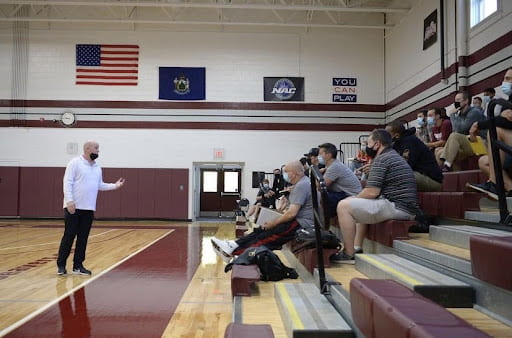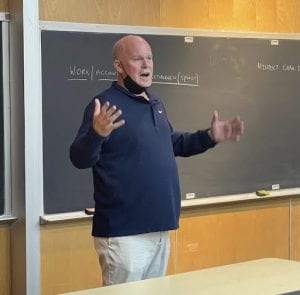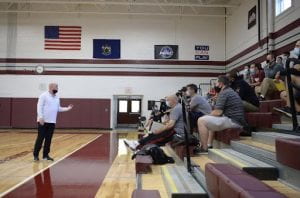Sep 27, 2021 | Exclusive, News |
By Annie Newman, Staff Writer.
With the Dining Hall returning to “normal,” one new addition combines the accommodating ways of COVID-19 with UMF’s drive for eco-friendliness: reusable to-go containers.
They allow students to take home a meal or any leftovers from the Dining Hall with a $5 deposit that the student gets back at the end of the year. For those who wish to socially distance themselves, it provides a meal without needing to be in the crowded dining hall.
“You fill up whatever you want in here with food, you bring us back the container, rinse it out, and we’ll give you another one,” manager for Sodexo at UMF Adam Vigue said. “We wash all the containers so we make sure it’s safe, so it’s gone through the Board of Health.”
As of Sept. 7, Vigue estimated that the dining hall had given out between 20 to 25 of them.
One of the bigger benefits that the containers promote is the drastic reduction of trash. Dex LaFrance, a sophomore at UMF, remembers last year when this was not the case.
“The plastic packets with the napkin and the plastic utensils, those were all over campus last year,” LaFrance said.
“We’re going through way less trash packaging wise,” Vigue said Sept. 13. “Last year we had a dumpster that we needed to bring in just to keep up with all the trash we had. We no longer need that.”
As a campus that prides itself on sustainability, the disappearance of styrofoam and plastic-packaged meals can be a welcoming sight in the dining hall. With the reusable containers, sustainability on the tail-end of a pandemic is on the rise.
Sep 27, 2021 | Exclusive, Opinion |
By Sophia Turgeon, Contributing Writer.
The Maine Department of Education announced this summer that they are eliminating the Praxis for aspiring teachers.
The Praxis is a series of tests created to fully equip college students for a career in teaching. The Praxis tests consist of multiple tiers of testing in certain subjects. Students were required to get certain scores on each test in order to advance into their practicum semester. On June 16 Governor Janet Mills signed a bill into law that resulted in Praxis exams being eliminated as a requirement for teachers.
Paige Polley, a current junior at the University of Maine at Farmington who took Praxis I is relieved that there is no more testing.
“As a person who doesn’t test well, Praxis did create a lot of stress for me that I feel like was unnecessary because it doesn’t reflect my intelligence and my ability to teach. However, with that being said, I did take my Praxis I at a time, which was $270 and I failed two of them, so I had to retest. And right after my retesting with passing results, I found out we didn’t need to take them anymore. I was upset and annoyed but now I don’t have to worry about Praxis II and wasting more money,” Polley said.
Money is oftentimes a concern for college students who have to spend hundreds of dollars on these tests.
Emma Williams, also a junior at UMF has a different way of thinking about Praxis exams being eliminated. Williams completed Praxis I and passed on her first attempt. She also had completed two portions of the Praxis II exams before the exam requirements were removed. With these tests being removed, students are worrying that they may not be as equipped for educating as some other teachers may be.
“I like it but it also concerns me. I’m happy I don’t have that pressure anymore, but worry when thinking about the future and how it will impact me, how I teach, and what I teach. How will I be compared to others who took them,” Williams said.
Williams also has taken both of her practicums and feels as though the Praxis exams served more as a refresher for general knowledge than a key element to being a good teacher.
“I feel as though the classes I was taking in college during my practicums were more important and impactful while in the classroom rather than the Praxis exams,” Williams confessed.
Individuals that are in the teaching community have been told how important these exams are to become certified educators. Now, without these exams being mandatory, students may feel some anxieties about how they will be successful teachers without the confidence of passing.
The Associate Professor of Secondary and Middle Education here at UMF, Clarissa Thompason, believes that these tests, along with standardized tests as a whole, are not the proper way to gauge whether or not a student would eventually become a good teacher.
“[…] I don’t think they [Praxis exams] really mark how bright you are, how motivated you are, or how well you’re gonna do in college. It discriminates against English language learners, it discriminates against kids from less privileged backgrounds, it discriminates against kids from poorer schools. It becomes a gateway here and kids who might be fantastic teachers can’t get past that and spend tons of money on it. So, they measure something, but it’s really small,” Thompson said.
Currently, licenced future Maine educators are required to get fingerprinted, earn at least a bachelor’s degree in education, and be accredited by a university.
Sep 27, 2021 | Exclusive, Feature, News |
By: Jessica Gervais, Contributing Writer
FARMINGTON – The University of Maine at Farmington recently welcomed Julia Bouwsma as the new professor of creative writing; Bouwsma also had the honor of being named Maine’s Poet Laureate earlier this summer.
Bouwsma has been writing poetry since she was in the third grade.
“I tell people I either wanted to be a poet or a pirate…I really liked pirates,” Bouwsma said.
Penelope Lawrence, a family friend and professor at Yale who came to her elementary school and volunteered to teach a class, was a huge influence who started her off on her writing career. Lawrence would take ‘adult poems’ as opposed to children’s poems and teach the kids about them, the students then memorized poems and got prompts they had to write about, according to Bouwsma.
It would seem that Bouwsma has always held a wild and free-running imagination right from the very early beginning.
“Poetry was sort of my first love with writing and it still is,” she said.
Because Bouwsma was only just recently elected as Maine’s Poet Laureate she said she is listening and learning every single day to find out more of what the title means, however she has plenty of ideas of how to utilize the title on her own.
To her being Maine’s Poet Laureate means more opportunity to know fellow Maine poets and work with them to expand Maine’s poet community. Bouwsma said she’s in the “throwing mashed potatoes at the ceiling to see what sticks” stage of her journey as a poet laureate. She expressed that she has many project ideas and just isn’t yet ready to share them. Although she did share that throughout her five-year term she plans to find other poets to collaborate with.
“I always think more minds are better than just mine.”
She explained that Maine is a wide state with very many different broad communities, there are plenty of chances to grow the poetry community. Teaching poetry is really important to her and she hopes to help grow connections between poets and the public, private, and home-school systems to further expand these connections.
Sep 27, 2021 | Opinion |
By: Reese Remington, Contributing Writer.
Farmington, ME – Earlier this year, the announcement came that classes would return in person. This brought an influx of students back to campus, which also meant more students looking for housing. Despite students’ eagerness to live off-campus this year, it was going to be an uphill battle with Farmington’s small real estate pool and competitive market.
One student, Riley Bartell, a fifth-year senior, had a rough time finding housing around Farmington. He even considered living in neighboring towns. After searching all summer, he was only able to find an apartment in Livermore Falls but it fell through.
“There were over 500 applications for this apartment, but I never heard back about it,” Bartell said.
Thankfully, a couple of friends from the baseball team had a room available near campus. Now Bartell doesn’t have to commute to school for his last year.
Roommates, Bailey Blow and Julia Halley are first-time off-campus living students. Their experiences also had obstacles. Both Blow and Halley lived on campus last year and knew it was time to transition to an apartment this year.
“It’s been great. I like that we have roommate dinners – it’s like have a little family. It’s cute. The dining hall was a reason for moving off-campus, so it’s nice having a kitchen and cooking.” Halley said.
Living off-campus doesn’t come easily though. Planning is key to work with how competitive the market is. For Blow and Halley, finding an apartment took months in advance.
“Look early. It was really hard to find this place. Make sure you can financially do it, too because it is a really big commitment. We started looking over winter break (Dec. 2020) for this apartment because three and four bedrooms are a lot harder to find.” Blow said.
While residents in Farmington are calling it a housing crisis, realtor Byron Staples at Foothills Management isn’t as quick to call it that. He sees it as more of a competitive market right now due to a couple of factors. Two large issues that are contributing to the market are the lack of residents moving out of their current residence, and “outside people” coming in. Staples said about “two-thirds of apartments” that typically would go on the market during the season, didn’t.
Currently, there is a solar farm project in Farmington that began in July 2020. The project employed over 300 out-of-state employees all of whom took up any available housing in the area, whether it was hotels or residences.
However, the project should be slowing down by winter this year. With limited housing, it’s important to be sure and proactive while looking for housing, according to Staples.
“In this area, companies market June availability in Jan. and Feb. This means you have to be proactive. Don’t hesitate, and when a landlord reaches out, consider it as a job interview.” Staples said.
It would seem that the competitive market in Farmington may be opening up soon. Though with the pandemic still ongoing, it’s uncertain just how much will change.
For students looking to transition from on-campus to off-campus housing next year, being proactive during the process is key.

Sep 27, 2021 | Feature, News, Sports, TopStory |
By Michael Levesque, Assistant Editor.

Photo from the UMF Athletic Department
On September 10, 2021, student-athletes and members within the University of Maine Farmington athletics department had the opportunity to listen to alumumnist and National Basketball Association coach, Steve Clifford.
Clifford returned to the college from which he graduated in 1983 to talk about his experience coaching basketball at the highest level. Clifford, who graduated from the university in 1983 with a bachelor’s degree in special education, played basketball for UMF all four years. After graduation, he coached at the high school and college level before accepting a position as an assistant coach for the New York Knicks in 2001. Clifford was an assistant coach in the league for 12 more years before becoming the head coach for the Charlotte Hornets in 2013 and later the Orlando Magic. Today Clifford is a coaching consultant for the Brooklyn Nets.
Clifford first talked to a large group of UMF student athletes, where he touched on values that he believes are not only good for NBA players, but athletes in general. “Work, accountability and togetherness… These are the three main ideas that he focuses on with the NBA teams that he has coached,” said McKenna Brodeur in an email. Brodeur is a captain on the women’s soccer team and a post player on the women’s basketball team. “All three ideas…impact a team’s culture,” she said. “Work requires you to put the effort in. Accountability means having discipline and showing up every day on time, as well as knowing the plays and sets. Lastly, togetherness is the goal of the team,” she said. “You need to be able to play together and have a plan to get better.” Brodeur mentioned that some of the messages she learned, she plans on taking to the soccer field. “I want to bring back what I learned from Coach Clifford back to the team. I think it will be a good reminder on why we cannot just show up to practice and expect greatness. We must work toward our goals and aim to do better every day,” Brodeur said.
Clifford’s visit then transitioned to the basketball court where he conducted a coaching clinic. With UMF men’s basketball players on the court and coaches from around the state in the bleachers, Clifford conducted a few drills and offered coaches advice on running a successful basketball team. “[Clifford] showed us different drills and plays and how they transitioned to success at the NBA level,” said Jack Kane, a center on the men’s basketball team. Kane mentioned how other coaches were there to learn as much from Clifford as they possibly could, including UMF’s own coach Sam Leal. “Coach was taking notes in the stands, listening. He was not ‘coaching’ at all,” said Kane. Kane, like the other members of the team actually completing the drills that day, hopes that what they learned from Clifford can translate to a successful season this winter.

For more photos of Clifford’s visit, check out the athletic department’s instagram page @umfatheltics.


